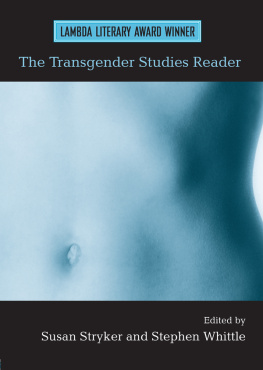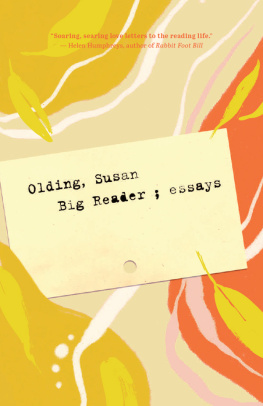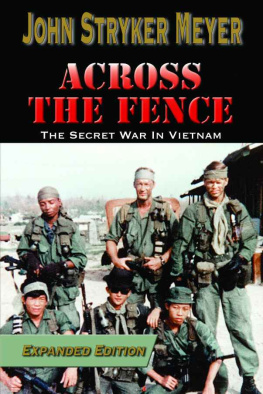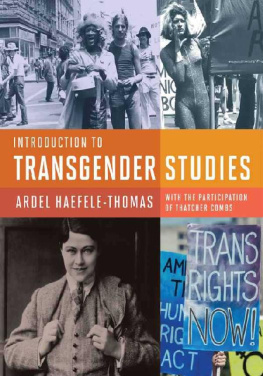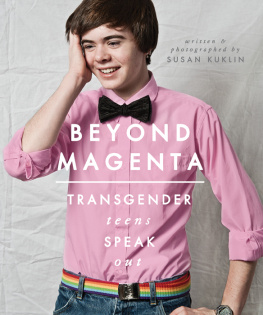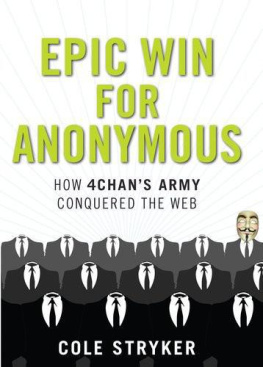Stryker Susan - The Transgender Studies Reader
Here you can read online Stryker Susan - The Transgender Studies Reader full text of the book (entire story) in english for free. Download pdf and epub, get meaning, cover and reviews about this ebook. publisher: Taylor and Francis, genre: Politics. Description of the work, (preface) as well as reviews are available. Best literature library LitArk.com created for fans of good reading and offers a wide selection of genres:
Romance novel
Science fiction
Adventure
Detective
Science
History
Home and family
Prose
Art
Politics
Computer
Non-fiction
Religion
Business
Children
Humor
Choose a favorite category and find really read worthwhile books. Enjoy immersion in the world of imagination, feel the emotions of the characters or learn something new for yourself, make an fascinating discovery.
- Book:The Transgender Studies Reader
- Author:
- Publisher:Taylor and Francis
- Genre:
- Rating:3 / 5
- Favourites:Add to favourites
- Your mark:
- 60
- 1
- 2
- 3
- 4
- 5
The Transgender Studies Reader: summary, description and annotation
We offer to read an annotation, description, summary or preface (depends on what the author of the book "The Transgender Studies Reader" wrote himself). If you haven't found the necessary information about the book — write in the comments, we will try to find it.
The Transgender Studies Reader — read online for free the complete book (whole text) full work
Below is the text of the book, divided by pages. System saving the place of the last page read, allows you to conveniently read the book "The Transgender Studies Reader" online for free, without having to search again every time where you left off. Put a bookmark, and you can go to the page where you finished reading at any time.
Font size:
Interval:
Bookmark:
The Transgender Studies Reader
Published in 2006 by
Routledge
Taylor & Francis Group
711 Third Avenue, 8th Floor
New York, NY 10017
2006 Susan Stryker and Stephen Whittle
Routledge is an imprint of Taylor & Francis Group
International Standard Book Number-10: 0-415-94708-1 (Hardcover) 0-415-94709-X (Softcover)
International Standard Book Number-13: 978-0-415-94708-4 (Hardcover) 978-0-415-94709-1 (Softcover)
No part of this book may be reprinted, reproduced, transmitted, or utilized in any form by any electronic, mechanical, or other means, now known or hereafter invented, including photocopying, microfilming, and recording, or in any information storage or retrieval system, without written permission from the publishers.
Trademark Notice: Product or corporate names may be trademarks or registered trademarks, and are used only for identification and explanation without intent to infringe.
Library of Congress Cataloging-in-Publication Data
The transgender studies reader / edited by Susan Stryker and Stephen Whittle.
p. cm.
Includes bibliographical references and index.
1. Transsexualism. 2. Transvestism. 3. Transsexuals. 4.
Transvestites. I. Stryker, Susan. II. Whittle, Stephen, 1955
HQ77.9.T73 2006
306.768--dc22 2005037854
| Visit the Taylor & Francis Web site at and the Routledge Web site at |
Stephen Whittle
Susan Stryker
Richard von Krafft-Ebing
Magnus Hirschfeld
David O. Cauldwell
Harry Benjamin
Robert Stoller
Harold Garinkel
Charles Shepherdson
Donna Haraway
Esther Newton
Janice G. Raymond
Carol Riddell
Lou Sullivan
Suzanne J. Kessler and Wendy McKenna
Judith Butler
Stephen Whittle
Leslie Feinberg
Sandy Stone
Kate Bornstein
Susan Stryker
Jay Prosser
Jacob Hale
Cheryl Chase
Dean Spade
Bernice L. Hausman
Joanne Meyerowitz
Aaron H. Devor and Nicholas Matte
David Valentine
Nan Alamilla Boyd
Patrick Caliia
Zachary I. Nataf
Jordy Jones
Gayle Rubin
Henry Rubin
Jamison Green
Jason Cromwell
Heather K. Love
George R. Brown
Riki Anne Wilchins
Nikki Sullivan
Rita Felski
Judith Halberstam
Viviane K. Namaste
T. Benjamin Singer
Andrew Sharpe
Marjorie Garber
Katrina Roen
Evan B. Towle and Lynn M. Morgan
Helen Hok-Sze Leung
Emi Koyama
Richard Juang
The authors were blessed with an enthusiastic editor at the outset of this project, Karen Wolny, who was unfortunately unable to bring this project to fruition with us at Routledge. We thank Kimberly Guinta for finally bringing this book to press after seemingly endless delays, and Daniel Webb for as-sembling the manuscript and securing permissions for work republished in The Transgender Studies Reader. We also thank Don Romesburg for his intrepid bibliographical assistance, and Texas Starr for administrative support in the preparation of this manuscript. We are indebted to our families for indulging the absences and interruptions occasioned by our work on this project. Most importantly, we would like to thank our friends, colleagues, and other transgender studies scholars for producing the work collected between these pages.
Trans identities were one of the most written about subjects of the late twentieth century. New communities of transgender and transsexual people have created new industries, a new academic discipline, new forms of entertainment; they offer new challenges to politics, government, and law, and new opportunities to broaden the horizons of everyone who has a trans person as their neighbor, coworker, friend, partner, parent, or child. Any Internet search, whether of Web sites, news articles, or academic papers, will produce thousands of results. A recent Google search for transsexual gave 3 million hits. Using the term transgender in an attempt to reduce the number porn sites actually retrieved far more: 7.5 million hits. The sites range from small personal projects to very large ones, such as the U.S. social organization Transgender Forum;
A trans identity is now accessible almost anywhere, to anyone who does not feel comfortable in the gender role they were attributed with at birth, or who has a gender identity at odds with the labels man or woman credited to them by formal authorities. The identity can cover a variety of experiences. It can encompass discomfort with role expectations, being queer, occasional or more frequent cross-dressing, permanent cross-dressing and cross-gender living, through to accessing major health interventions such as hormonal therapy and surgical reassignment procedures. It can take up as little of your life as five minutes a week or as much as a life-long commitment to reconfiguring the body to match the inner self. Regardless of the fact that trans identities are now more available, the problems of being trans have by no means been resolved. In many parts of the world, having a trans identity still puts a person at risk of discrimination, violence, and even death.
A trans person might be a butch or a camp, a transgender or a transsexual, an MTF or FTM or a cross-dresser; they might, in some parts of the world, consider themselves a lady boy, katoey, or even the reclaimed Maori identities whakawahine or whakatane. Some communities and their terms are ancient, such as the Hijra from Northern India, but many are more modern. the word trans, referring to a trans woman or trans man (of whatever subtype of trans identity) is a very recent take on the umbrella term transgender. Although there had been some previous usage in the 1990s (e.g., in the creation of the online group Trans-Academics), trans as a stand-alone term did not come into formal usage until it was coined by a parliamentary discussion group in London in 1998, with the deliberate intention of being as inclusive as possible when negotiating equality legislation. Cultural spaces and historiographies are constantly reframing the community, the identities, the cultures, and the language. We see new language being developed constantly; for example per as a pronoun was developed by UK community members with nonexistent gender identities, and similarly the U.S. term hir for those who have both.
The growth of home computer use in the 1990s, and the encouragement of many trans women at the forefront of information technology and Internet development, was crucial to the development of a new, geographically dispersed, diverse trans community in the 1990s (Whittle, 1998). Online, this newly formed community was able to discuss its experiences of fear, shame, and discrimination, and, as a result, many community members developed newly politicized personal identities. This new politicization forged a determination to change the world, by every means possible, for the next generation of trans youth. Significant changes have indeed taken place. At the very least, where once there was
Next pageFont size:
Interval:
Bookmark:
Similar books «The Transgender Studies Reader»
Look at similar books to The Transgender Studies Reader. We have selected literature similar in name and meaning in the hope of providing readers with more options to find new, interesting, not yet read works.
Discussion, reviews of the book The Transgender Studies Reader and just readers' own opinions. Leave your comments, write what you think about the work, its meaning or the main characters. Specify what exactly you liked and what you didn't like, and why you think so.

